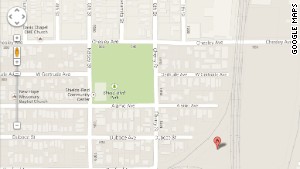Google to remove Maps image of slain teen
Google says it will replace a Google Maps image after a California
father complained it shows the body of his teen-age son, who was shot to
death in 2009.

Jose Barrera, of Richmond, California, said he discovered the image, visible on Google Maps' satellite view feature, last week.
"When I see this image, it's still like that happened yesterday," Barrera told KTVU-TV in Oakland, a CNN affiliate. "And that brings me back to a lot of memories."
Kevin Barrera, 14, was
shot and killed in 2009. Police discovered his body near a railroad
track in Richmond on August 15 of that year, at an address that roughly
matches the one of the scene in question.
His killer has not been found.

A satellite image of this area on Google Maps shows what a California man says is his son's dead body.
"Our hearts go out to the
family of this young boy ...," said Brian McClendon, vice president of
Google Maps, in a written statement sent Monday to CNN and other media
outlets. "Google has never accelerated the replacement of updated
satellite imagery from our maps before, but given the circumstances we
wanted to make an exception in this case."
McClendon said replacing
the image will take about eight days and that Google has spoken to the
Barrera family "to let them know we're working hard on the update."
The image, which was
still accessible on Google Maps on Monday afternoon, shows a police
cruiser and a small group of people standing near what appears to be a
prone human form near a set of train tracks.
CNN will not show the
image without approval from the slain teen's father. Messages left for
Barrera had not been returned as of Tuesday morning.
Barrera had said he
planned to formally complain to Google and to lobby state lawmakers for
their help in removing the image if needed.
"What's the point to
show those pictures to the people, you know -- pictures of my dead son?"
he said. "This is really painful to the whole family."
People frequently ask
Google to remove content they find objectionable on its Maps pages,
including Street View and Google Earth.
In many cases, the company declines such requests, though it's not a sure thing.
"Your privacy and security are important to us," the company writes on a Google Maps privacy page.
"The Google Maps team takes a number of steps to help protect the
privacy and anonymity of individuals when images are collected for
Street View, including blurring faces and license plates. You can easily
contact the Street View team if you see an image that should be
protected or if you see a concerning image."

0 comments:
Post a Comment